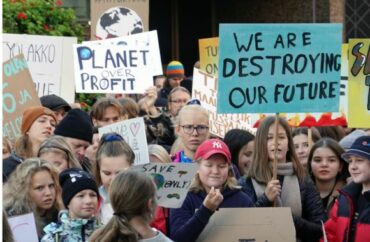
Gen Z suffers from ‘psychological distress’ over ‘climate change’
About half of Gen Z struggles with “eco-anxiety” and wants universities to take a more active role in solving their climate change concerns, a new poll shows.
The poll’s findings break down distress levels among fifteen to twenty-nine-year-olds about climate change. More than half of the polled youth identify with the highest level, which the study names “eco-anxiety.”
These youth agree with the statement: “My level of concern for climate change causes psychological distress that impacts my daily life.” Further, seventy-four percent of youth are “personally worried about climate change.”
The Institute for Sustainability & Social Justice at Sacred Heart University in Fairfield, Connecticut, conducted the poll, which is called “Distress and Desires—United States Youth on Sustainability, Social Justice, Climate Change and the Role of Higher Education.” The think tank did not respond to multiple emailed requests for comment on the poll in the past month from The College Fix.
The poll’s findings are not fixed to any specific region of the country. In addition to agreeing about the problem, most youth want institutions, public and private, to take responsibility for solving it.
“Respondents place primary responsibility for addressing these issues on federal and state governments, with less emphasis on educational institutions or religious organizations,” the poll authors state.
The youth also agreed on the role of colleges and universities, which they think should be involved.
“Across U.S. census regions, 18-29-year-olds gave high importance to the idea that colleges and universities should teach about sustainability and social justice,” the poll says, “and felt that colleges and universities were integrating sustainability and social justice principles into their organizations.”
The survey authors also asked the youth what roles they want colleges and universities to fill regarding climate change.
Forty-eight percent said they want courses that “Provide education and awareness programs on climate change,” while 44 percent said, “Encourage community engagement and participation in climate action. About 40 percent of respondents picked “Advocate for and implement policies and practices to reduce the effects of climate change.”
MORE: University of California system rolls out group-therapy climate anxiety course
The poll is the latest survey to reveal widespread concern among young Americans about climate change. Very few respondents, however, show a willingness to sacrifice all luxuries for the cause.
Last year, Young America’s Foundation conducted a poll asking climate-concerned students what they would personally do to combat climate change. Only 13 percent of students who think climate change is an “existential threat” said they would give up their smartphones. For context, 17 percent said they would sacrifice air conditioning, and 48 percent said they would give up gas stoves.
The Sacred Heart poll reveals similar results. When prompted about personal steps to help address climate change, only 36 percent said they would start reducing their carbon footprint, and 39 percent said they would eliminate their consumption.
A climate and environmental expert said the results are “not surprising.”
Heartland Institute’s Anthony Watts told The Fix via email “virtually every climate change policy requires people to give up or change something, there’s never any positive aspects to the climate edicts on a personal level.”
“Climate change is so far off in the distance, most people don’t consider it enough of a threat to do anything about,” the senior fellow who regularly writes about climate issues told The Fix.
Watts also said he is doubtful government action would do anything about climate change. “Government is not likely to be effective, as history shows us that governments on all levels managing anything tend to decline into wasteful spending, bureaucracy bloat, and ineffectiveness,” he said. “Just visit any DMV or try to get an accurate answer from the IRS to witness this yourself.”
Another poll released earlier this year by the Committee to Unleash Prosperity, however, found that just under nine in ten Ivy League graduates support “strict” rationing of goods, including meat and electricity, to fight climate change.
A majority of the broader public is against the policy, however.
MORE: CU Boulder professor dresses like butterfly to fight ‘climate anxiety’
IMAGE: JRJ Fin/Shutterstock
Like The College Fix on Facebook / Follow us on Twitter






Please join the conversation about our stories on Facebook, Twitter, Instagram, Reddit, MeWe, Rumble, Gab, Minds and Gettr.